At least 94 people were killed and another 26 missing after an unlicensed and heavily overloaded ferryboat capsized off the northern coast of Mozambique on Monday.
Mozambique officials said the ferry was a converted fishing boat that was headed for an island off the coast of Nampula province. The boat was overloaded because people were fleeing from a cholera outbreak in mainland Mozambique.
“Because the boat was overcrowded and unsuited to carry passengers, it ended up sinking,” Nampula Secretary of State Jaime Neto said.
Rescue workers reportedly recovered five survivors in addition to 94 bodies. Some of the fatalities were children. Local water conditions are extremely rough. According to local media reports, the overloaded ferry capsized when it was hit by a tidal wave. Social media videos showed the corpses of both adults and children washing ashore on local beaches.
Mozambique is currently suffering through its worst cholera outbreak in 25 years, with a large number of cases reported in Nampula province. Over 13,700 cases of cholera have been reported since October, with about 30 deaths. Nampula also has a large number of refugees from neighboring Cabo Delgado province, which has been wracked by jihadist violence for the past six years.
The island the overloaded ferry was trying to reach, known as the Island of Mozambique, was the regional capital under Portuguese colonial rule. The island is a UNESCO World Heritage Site due to its well-tended 16th-century architecture. In addition to the passengers seeking relief from the cholera epidemic, some of the people aboard the ferry were reportedly hoping to attend a festival on the historic island.
Local journalist Charles Mangwiro told the BBC that poor government oversight of Mozambique’s vast fleet of unlicensed ferries has caused a string of recent accidents, although none of the others has been nearly as deadly as Monday’s disaster.
“It’s shocking – the authorities are partly to blame for not doing enough to control and monitor sea traffic,” Mangwiro said.

COMMENTS
Please let us know if you're having issues with commenting.